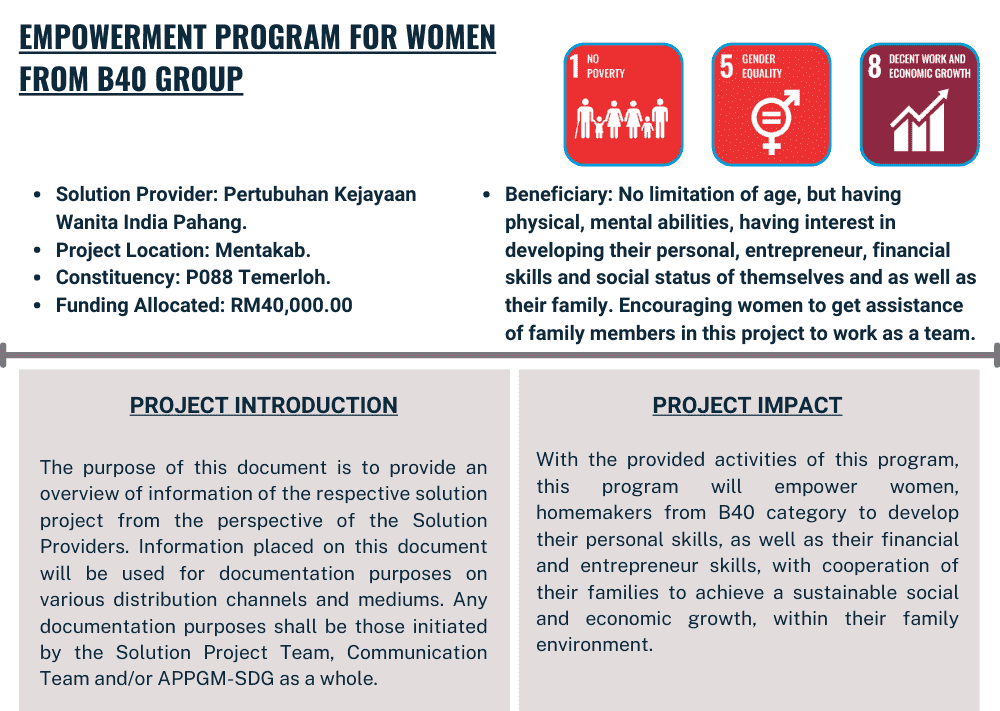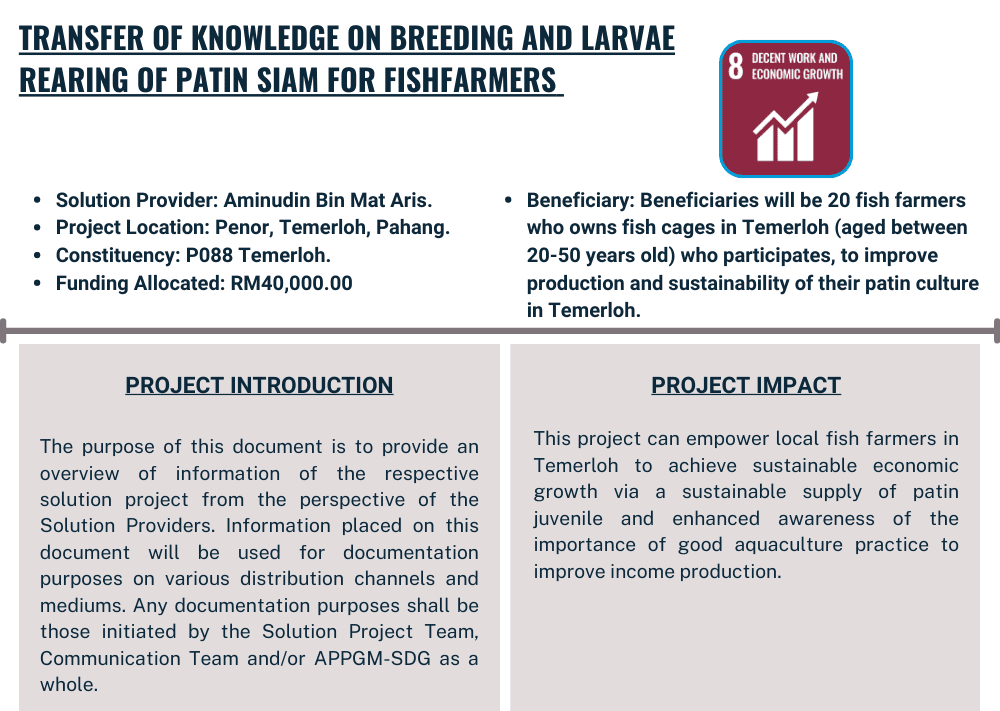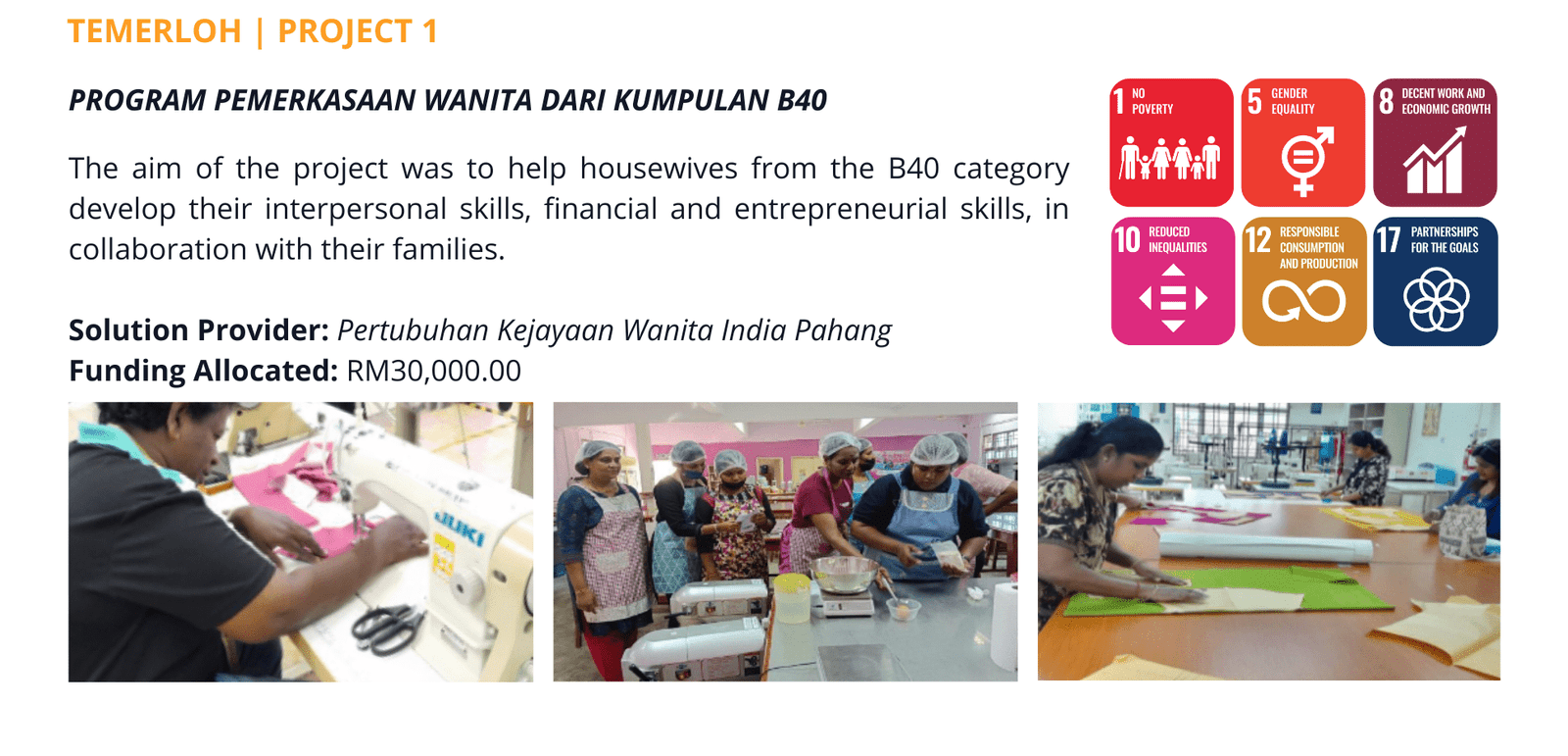Temerloh, Pahang
2021
SOLUTION PROJECT 1

Project description
The solution project proposed in Mentakab, Temerloh aims to provide skills training and coaching for local women in different fields related to income generating activities. This project solution also aims to enhance and motivate women especially from B40 category to develop their personal interest and abilities to generate income especially during this pandemic time and financial crisis.
Thus, this project solution offers few trainings related to job security skills, financial management and entrepreneurship skills to the participant so that the participant can have a better livelihoods and better life. This project solutions are open to communities from any age, having physical, mental abilities, having interest in developing their personal, entrepreneur, financial skills and social status of themselves and as well as their family. This project also encourages women to get assistance of family members in this project to work as a team especially during this time of uncertainty (MCO) and financial crisis.
With the provided activities of this program, this program will empower women, homemakers from B40 category to develop their personal skills, as well as their financial and entrepreneur skills, with cooperation of their families to achieve a sustainable social and economic growth, within their family environment. The solution provider of this project is Pertubuhan Kejayaan Wanita India Pahang. The project duration is around five months with an allocation of RM40,000.
The main SDGs impacted through this project solution are Goal 1 – End poverty in all its form everywhere, Goal 5 – Achieve gender equality and empower all women and girls, Goal 8 – Promote sustained, inclusive and sustainable economic growth, full and productive employment and decent work for all, Goal 10– Reduce inequality within and among countries and Goal 12 – Ensure sustainable consumption and production patterns.

SOLUTION PROJECT 2

Project description
Fish farming is an agricultural venture that has the potential to be developed as a source of income that can help the low-income group. Currently, in the Temerloh district, more than 400 farmers are involved in fish farming whether it is fiberglass tanks, soil ponds, cement ponds, canvas ponds or cages in the river. Cage farming is a method practiced by more than 300 farmers.
The challenge of cage fish farming is the uncertainty of river water pollution due to development work and industrial or domestic pollution upstream; and an uncertain supply of fry. Observations of operators report the average mortality in the economic life cycle of farmed fish has increased from 5% twenty years ago to over 20% now and can reach up to 50% mortality.
The project solution will provide some training and courses for beneficiaries among 15 cage fish farmers and 25 youths, including family members in their household income-generated on management methods in the field of entrepreneurship, finance and even digital marketing. The project solution provider is Pertubuhan Rangkaian Pembangunan Kesinambungan Malaysia. The project duration is five months with an allocation of RM40,000.
This project trains farmers with financial management skills, sustainable livestock management as well as diversity such as fish hatchery to produce baby fish for the needs of farmers in Temerloh and other districts in Pahang. The project also established the Fish Cage Technology Center (FishTech Temerloh) by training Giat MARA trainees for the fabrication of cages to reduce the initial investment cost for cage fish farming.
The main SDGs impacted through this project solution are Goal 1 – End poverty in all its form everywhere, Goal 4 – Ensure inclusive and equitable quality education for all, Goal 5 – Achieve gender equality and empower all women and girls, Goal 8 – Promote sustained, inclusive, and sustainable economic growth, full and productive employment and decent work for all and Goal 10 – Reduce inequality within and among countries.

SOLUTION PROJECT 3

Project description
Unsustainable supply of Patin Hitam seed and disease are two major problems in Patin aquaculture in Malaysia. Mortality due to disease infection caused loss of thousand ringgit to fish farmers. Although Patin has been extensively cultured, basic aquaculture and good management practice among the fish farmer still inadequate.
Basic skills in aquaculture for fish farmers can be transferred via knowledge transfer courses with adequate modules, practical and monitoring. Five sessions of class and practical has been planned to be taught to fish farmers in Temerloh, Pahang to provide them basic understanding in aquaculture from breeding until larval rearing.
After the series of class and practical, it is envisioned that the fish farmer will be well equipped with knowledge and experience in producing constant supply and high-quality seed of Patin Hitam with good management practice. This will help nurture the industry and provide good food for nation.
The beneficiaries will be 20 fish farmers who owns fish cages in Temerloh (aged between 20-50 years old) who participates, to improve production and sustainability of their patin culture in Temerloh.
The provider of this project solution funded by APPGM-SDG is Aminudin Bin Mat Aris. The project duration is around four months with an allocation of RM40,000.
The main SDGs impacted through this project solution is Goal 8 – Promote sustained, inclusive and sustainable economic growth, full and productive employment and decent work for all.

2022

